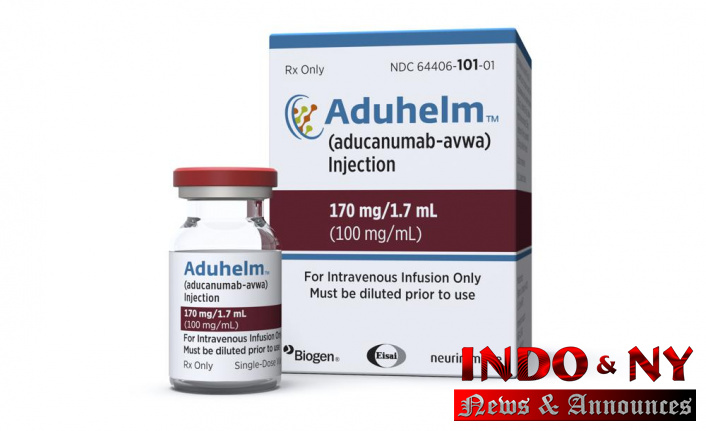Many major medical centers are still undecided about whether or not to use Biogen’s Aduhelm. This is the recommended treatment for the early stages of the disease. Major medical centers like Mass General Brigham in Boston and the Cleveland Clinic have said they will not use it.
One neurology practice even expelled the company's sales representatives from its offices due to concerns about the drug's price and potential for it to rise past $50,000 per year.
Many doctors feel they must learn more about Aduhelm and the benefits before they offer it to patients. This could take many months. There may be questions that remain even after the process is completed.
Salim Syed, an analyst covering Biogen for Mizuho Securities USA, stated that "the drug won't work for everyone, even with access."
Syed estimates that around one-tenth (or less) of people with early-stage Alzheimer’s will end up taking Aduhelm regularly, particularly if regulators approve similar treatments by Biogen's rivals.
Biogen reports its third quarter financial results Wednesday. However, it doesn't say how many people have been given the drug since June 7. A company executive stated last month that Biogen knew of approximately 50 Aduhelm sites, far less than the 900 it had claimed to have in its possession shortly after the drug was approved by regulators.
Aduhelm is one of a number of new drugs that promises to slow down the progression of this fatal brain-destroying disease.
Dr. Stephen Salloway of Rhode Island, a neurologist and Biogen consultant, said that the drug is "like a breath-taking fresh air." Alzheimer's patients "know what's ahead, and they want everything they can do to stay in the milder stages."
Aduhelm was approved by the U.S. Food and Drug Administration despite objections from several independent advisors who have since resigned. Later, the agency stated that Aduhelm was suitable for patients with mild cognitive impairments or early-stage Alzheimer’s.
Aduhelm removes brain plaque believed to be linked to Alzheimer's disease. The decision was made by regulators based on research results that showed the drug would likely benefit patients.
Biogen, which co-developed Aduhelm with Japan’s Eisai Co. had to stop two studies due to disappointing results. Later, it said that further analysis had shown the treatment's effectiveness at higher doses.
Biogen is required by the FDA to perform a follow up study.
According to Dr. Brendan Kelley at UT Southwestern Medical Center, Dallas, the research Biogen has submitted so far does not give doctors as much information as they would normally need about a drug. Aduhelm is still being reviewed by its experts.
He said that Biogen submitted preliminary data to FDA, making it difficult to navigate. Kelley stated that doctors would be able to better understand how the drug works in a wider patient population if there was more research.
Another concern is cost.
According to signs placed on the doors of The Neurology Center's Washington, D.C.,-area office, Biogen's pricing policy for Aduhelm is "irresponsible" and "unconscionable". Aduhelm is also referred to as a medication of "dubious effectiveness". The signs inform Biogen sales reps that they are not welcome in the center's offices.
One sign reads, "As doctors we feel compelled speak out and protest BIOGEN’s actions."
Wendy Van Fossen, CEO of Neurology Center, stated that the signs were put up in July. However she declined to give any explanations.
In an email, a Biogen spokesperson stated that it was disappointing that certain centers were refusing access to the drug.
According to Dr. Maha Radhakrishnan, Biogen Chief Medical Officer, Aduhelm's efficacy is "reasonably likely" to predict clinical benefits. She stated that regulators looked at data from over 3,000 patients and included two studies in the late-stage of research.
Doctors are also concerned about whether Aduhelm patients will be able receive the brain scans that are required to monitor their progress.
The clinical research didn't explore issues of care access, as patients were generally older and healthier than the general population. Dr. Zaldy Tan is the director of the Cedars-Sinai Memory and Aging program.
Aduhelm is being evaluated by the Los Angeles Health System. The committee of experts is examining issues such as which doctors will prescribe Aduhelm and how patients can be monitored for headaches or dizziness. Another possible side effect is bleeding in the brain.
Tan stated that safety and accessibility are important issues that must be given priority.
Radhakrishnan noted that Aduhelm requires greater coordination between doctors than other Alzheimer’s treatments.
Prescribers must work closely with radiologists, neurologists, and nurse practitioners in order to diagnose patients and confirm the presence or absence of plaque in their brains. Then, they will start the treatment and monitor them.
Radhakrishnan stated, "All of it is work in progress."
Another problem is uncertainty about insurance coverage.
Some insurance companies have declined to cover the drug. Other insurers, such as the major Medicare Advantage insurance Humana, have not yet made a decision but are still reviewing each case.
Federal Medicare will make a determination on national coverage by next spring. This will determine how the drug is handled.
Biogen executives stated recently that they believe most sites offering the drug are still waiting for clarification on reimbursement, including the Medicare decision.
The Cedars-Sinai experts are concerned about Medicare's determination. Tan stated that they are aware they need to reach a decision before Medicare prompts more patient inquiries.
He stated that doctors are also aware they are not only evaluating Aduhelm; they're also considering how to handle similar treatments, which could be approved by FDA.
Tan stated, "We want it to be right."











